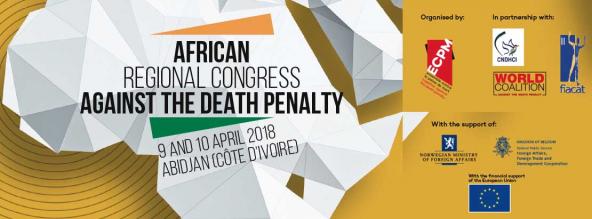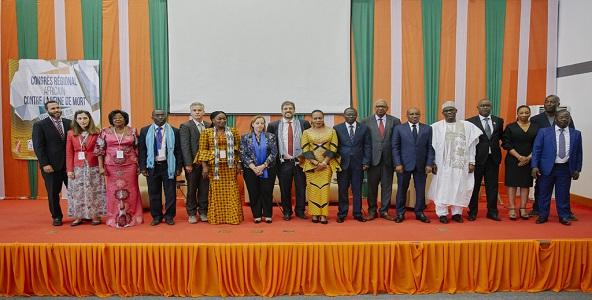
3rd Regional Congress Against the Death Penalty
Africa
The event is organised by ECPM, in partnership with the World Coalition Against The Death Penalty, FIACAT and the CNDH-CI. More than 300 participants are expected to attend these two days of debates, two official ceremonies of opening and closing, as well as a festive closing evening.
PROGRAMME
9 APRIL
A solemn opening ceremony will take place prior to the debates, on 9 April, from 10am to 12pm, at the Conference Centre of the Ministry of Foreign Affairs.
A closed meeting for member organisations of the World Coalition and ACATs who participated in the programme for the abolition of the death penalty in Africa 2015-2018 will take place from 2pm to 6pm at CRRAE. This capitalisation workshop will allow civil society to reflect on the past few years and draw strategies for the future.
Round table 1: “Death penalty, a colonial heritage?”
– 9 April, CRRAE, from 2pm to 4pm
Precolonial criminal punishment practices often relied on banishment or compensation. The various colonisations therefore played a major role in the use of death penalty.
Closed meeting 2 –“Training media and journalists: how to report on death penalty and its related issues”
– 9 April, CRRAE, from 4:30pm to 5:30pm
With Ivoirian media and African journalists selected for the quality of their work.
Closed meeting 3 – “Engaging parliamentarians”
– 9 April, CRRAE, from 2pm to 4pm
With parliamentarians who wish to or already have initiated parliamentarians’ networks.
10 APRIL
Plenary session: “Death penalty, poverty and prison conditions: from a World day to another”
– 10 April, CRRAE, from 10am to 12am
A constant pattern in the use of death penalty is its inextricable connection to poverty. Poverty has a negative impact on every step of the penal procedure and obviously affects living conditions in death row.
Round table 2 – “Death penalty, a political tool?”
– 10 April, CRRAE, from 2pm to 4pm
In numerous countries, death penalty is being applied under anti-terrorists laws and/ or by military courts. How are those emergency laws used as political tools, therefore causing democratic issues?
Workshop 1 – “Best practices for a defi nitive abolition in Africa”
– 10 April, CRRAE, from 2pm to 3pm
In 2017, 22 African states were regarded as de facto abolitionist countries. How can they move from a de facto moratorium to an irreversible abolition?
Workshop 2 – “Africans on death row in foreign countries, a consular duty”
– 10 April, CRRAE, from 3pm to 4pm
Numerous citizens from African countries, abolitionists or not, are being sentenced to death and executed around the world.
Which democratic measure could be taken by those States, and how to include them in advocacy toward the abolition?
Workshop 3 – “Mobilising the youth”
– 10 April, CRRAE, from 3pm to 4pm
How to engage the youth, in order to incite a change of mentalities in favour of the abolition?
Panel 1 – “The key role of international and regional protocols”
– 10 April, CRRAE, from 3pm to 4pm
With the members of the ACHPR’s Working Group on Death Penalty.
Panel 2 – “The mandatory death penalty”
– 10 April, CRRAE, from 2pm to 3pm
8 countries still maintain the mandatory death penalty in Africa.
Panel 3 – “Legal representation of people facing the death penalty”
– 10 April, CRRAE, from 2pm to 3pm
With African lawyers who are involved in the abolitionist fight; this panel will be about the legal representation of people facing the death penalty, from their arrest to their request for pardon.
The closing ceremony will be held at the CRRAE on 10 April, from 4pm to 6pm. It will be followed by a drink and a cultural festive evening at the Institut Français, from 6:30pm to 9pm.
The Steering Committee of the World Coalition Against the Death Penalty will meet on 11 April at the CRRAE.




